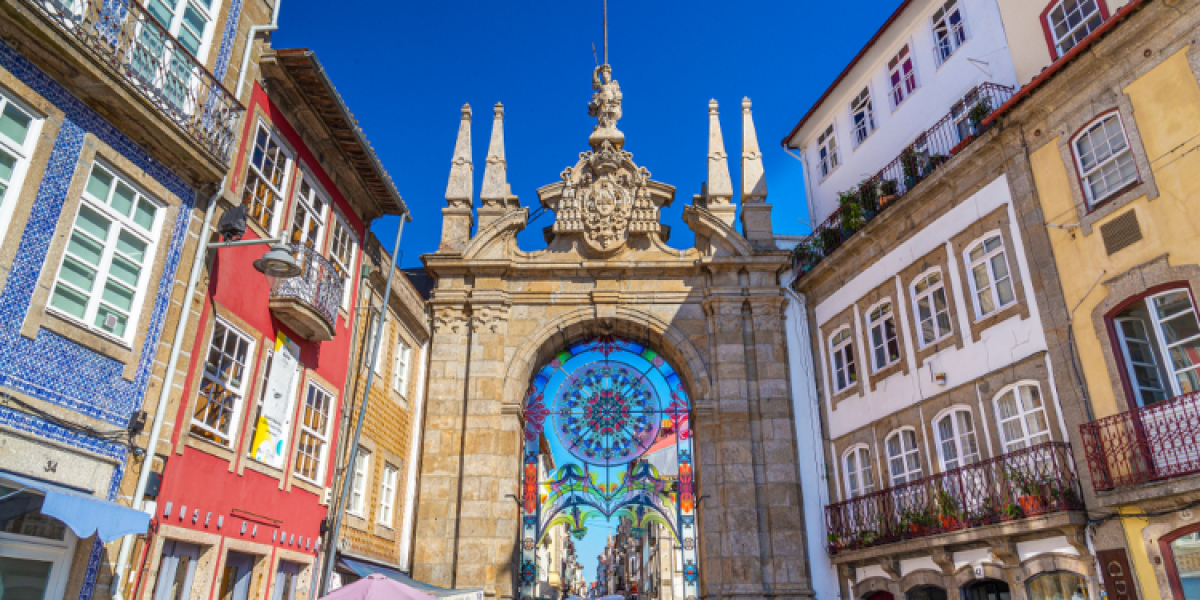
Diva is originally from Milan. After retiring, she moved to Braga, a city in the northwest of Portugal, alongside her partner. “This is a country we've fallen in love with,” she writes, “because life here has a rhythm and flavors which remind us of our youth.” Enjoy the read!
Please introduce yourself briefly: where are you from, and when did you leave Italy?
My name is Diva, and in 2015 I retired from my job as an administrative employee in Milan after 40 years of service. I have had a new partner for 5 years, and it's actually with him that the idea of leaving Italy really materialized. To be completely honest, this idea had been on my mind for a long time, but I was just waiting for the right time. I had previously lived for 4 years in Mexico, so I already had adaptability skills. I have no emotional ties to Italy or commitments in the country to keep me there. I should add that I am increasingly dismayed when I see the situation in Italy worsen with each passing government, governments that are incapable of making the most of all the positive things our country has to offer, and which instead keep squeezing companies and citizens to the hilt. Hence, the future in Italy did not look like a serene one to me. My partner, on the other hand, has two grown-up and independent children to whom he is very attached in Italy. They're the main reason we take trips back to Italy every 4-5 months.
Where did the idea of moving to Portugal come from?
The choice of Portugal as a destination came after a motorcycle trip that my partner undertook with his son there. He was so enthusiastic upon his return that we decided to take another trip from the south of Portugal (Algarve) up to the north. So there ended up being 3 trips in total, each of 15-20 days; we would choose a city and then rent a car to get around there. In the meantime, we also learned about their advantageous tax policies (our pension could be tax-free for the first 10 years), which really looked like the cherry on top of the cake.
In which city do you live, and what made you choose it?
We like the Portuguese; they are polite, helpful and honest people. We like the country, and we first visited Braga in October 2019. It really seemed like the city for us. It's a city designed on the human scale; it has all the necessary amenities, it's close to Porto Airport (50 km), and has rail and bus connections to Porto, Lisbon and other cities. It's also in a very green and hilly region, with large rivers and river beaches (Covo, Lima, Douro). It's only 30 km away from the sea (Apulia, Esposende) and 80km away from Galicia in Spain. It's a city that's rich in history (starting from Roman Bracara), and that has a lively old town full of beautiful buildings, squares and gardens. It really struck me to see that even jewelry stores here leave their doors wide open and that people at the bar can safely leave their belongings unattended if they go away for a moment.
It's a world different from the one we were used to. We decided that, at first, only my partner would do the paperwork related to the move while we waited to see if our first positive impressions would actually turn out to be true. In November 2019, we moved to a T2 (two-bedroom apartment) that was newly renovated and furnished with Ikea furniture, close to the city center, on the 4th floor of a building with a lift and heating, for €750 a month. I specify this because not all buildings from the 1970s are equipped with a lift and heating. After 3 years, I feel absolutely confident that we made the right decision, so in April this year, I also started my relocation paperwork. In the meantime, tax regulations have changed, and I need to pay 10% of personal income tax (IRS) for 10 years. I must point out that after 10 years, the taxes here are practically similar to those in Italy, which is very high.
How are you getting used to the Portuguese language?
As far as language is concerned, given that I am fluent in Spanish, I can understand about 90% of written Portuguese. Spoken Portuguese is a whole other matter; it is very tricky. Portuguese speakers elide many vowels, and they change their sounds. I've only recently been able to understand some of the spoken language. To give an example, what's written as “desculpe” is actually pronounced “dzculp.” Portuguese people go out of their way to understand us, though, and they do speak English well pretty much everywhere. This helps us a lot in public offices and businesses.
How do you like spending your days there?
Here in Braga, we have a library subscription, through which we also get updates about events in the city. There's a theater that has resumed its performances, mostly musicals, after the pandemic. There's a gym with multiple classes ranging from yoga to pilates, and there's a large multifunctional sports center with a big swimming pool. We also like going on road trips (excellent highways and very little traffic – not too expensive) and visiting places far and wide in our region of Minho and also in neighboring regions like the Douro Valley and Galicia in Spain.
Depending on the reason, nature offers stunning spectacles, with blooming flowers covering hillsides with yellow, pink, blue and white as far as the eye can see. There are groves of mimosa trees, gorse shrubs, pink and white heather and other rare flowers.
Have you managed to build a network of friends there?
We haven't managed to make many Portuguese friends, partly because of the restrictions imposed by the pandemic and partly because of the language barrier. But we have very friendly relations with the shopkeepers around us – the greengrocer, the seamstress, the butcher, the beautician, the hairdresser – as well as with the regulars at the bar and the neighbors. We also have relatives who've been living in Leiria for 3 years now, so we try to meet up with them regularly.
Speaking about Portugal, we imagine that there are aspects of life in this country (positive and negative) that you can only learn about while living there. What are they?
There are many things I appreciate here: there's a social awareness that ensures that are no architectural barriers and that all public offices are grouped in a single large head office (Loja do cidadão) that's open from 8:30 a.m to 7:30 p.m during the week, and from 9:30 a.m to 3 p.m on Saturdays. This head office covers, among other things, water, electricity, gas, telephone, road tax, social security, income tax and services for non-EU expats. There are many accountants and notaries here who charge
€20/30 for a tax return and €50 for a notarized power of attorney. There are also many private clinics here in Braga, as well as a large and new public hospital that opened 10 years ago. We “tested” that hospital two years ago when my partner broke his ankle. My partner, who is a doctor, rated the emergency department, the admission, surgery and hospitalization (at the height of the pandemic) as “excellent and professional,” and said that the staff treated him as a “special” patient, with a lot of human care. Other pleasant things about living here are the sense of personal safety at all times and the widespread sense of honesty and mutual respect.
The fact that Braga is, fortunately, less touristy than Lisbon, Porto or the Algarve certainly contributes to the well-being here. There's no such thing as standing to drink a coffee; you can sit at a table in one of the numerous cafés for as long as you want, without any extra charge. Another custom is to have bread and butter for breakfast; it's served warm and with the sandwich divided into two.
Museums and entertainment generally cost very little, and there are many religious festivals that allow everyone to participate in the folk festivities; they always involve volunteers of all ages, often entire families. Traditions and family are important for the Portuguese! There's one thing that really annoys the Portuguese: rudeness, loudness and not respecting your turn in a queue. Many Italians have to be careful.
If I need to say something negative, I'd say watch out for the Portuguese behind the wheel; they drive a bit too fast and recklessly, and they can stop abruptly in front of a pedestrian crossing. When it comes to our personal taste in food, we don't like the way they make brioches here, the small range of cured meats are smoked, and the hams here (both raw and cooked) leave much to be desired. The cuisine is generally good, but it is quite simple and repetitive. You will find octopus, cod, sea bass, sea bream, scabbardfish, kid goat meat, veal, chicken and pork in nearly all restaurants, big or small, always served with rice, potatoes, cabbage, carrot, beans or mixed salad. The “sopinha” is an unmissable staple dish; it's a simple vegetable soup. There are also many pizzerias, including Italian ones, that offer pasta dishes in addition to pizza.
Do you have any advice for those who are about to move to Portugal or have just moved there so that they might face the challenges of their new life more easily?
I often read that €1,500 per month is enough to live well in Portugal. If you can, here in Braga, buy a T2 (two-bedroom apartment) for €250,000, then you can live on €1,500 with our very normal (non-luxury) rents, but otherwise, it can be quite difficult if your rent and utilities like water, gas and phone use up €1,000 of it. As for me, I'm selling my apartment in Milan so that I can pool my savings with my partner's and buy a house around here. This is a country we've fallen in love with because life here has a rhythm and flavors which remind us of our youth.



















